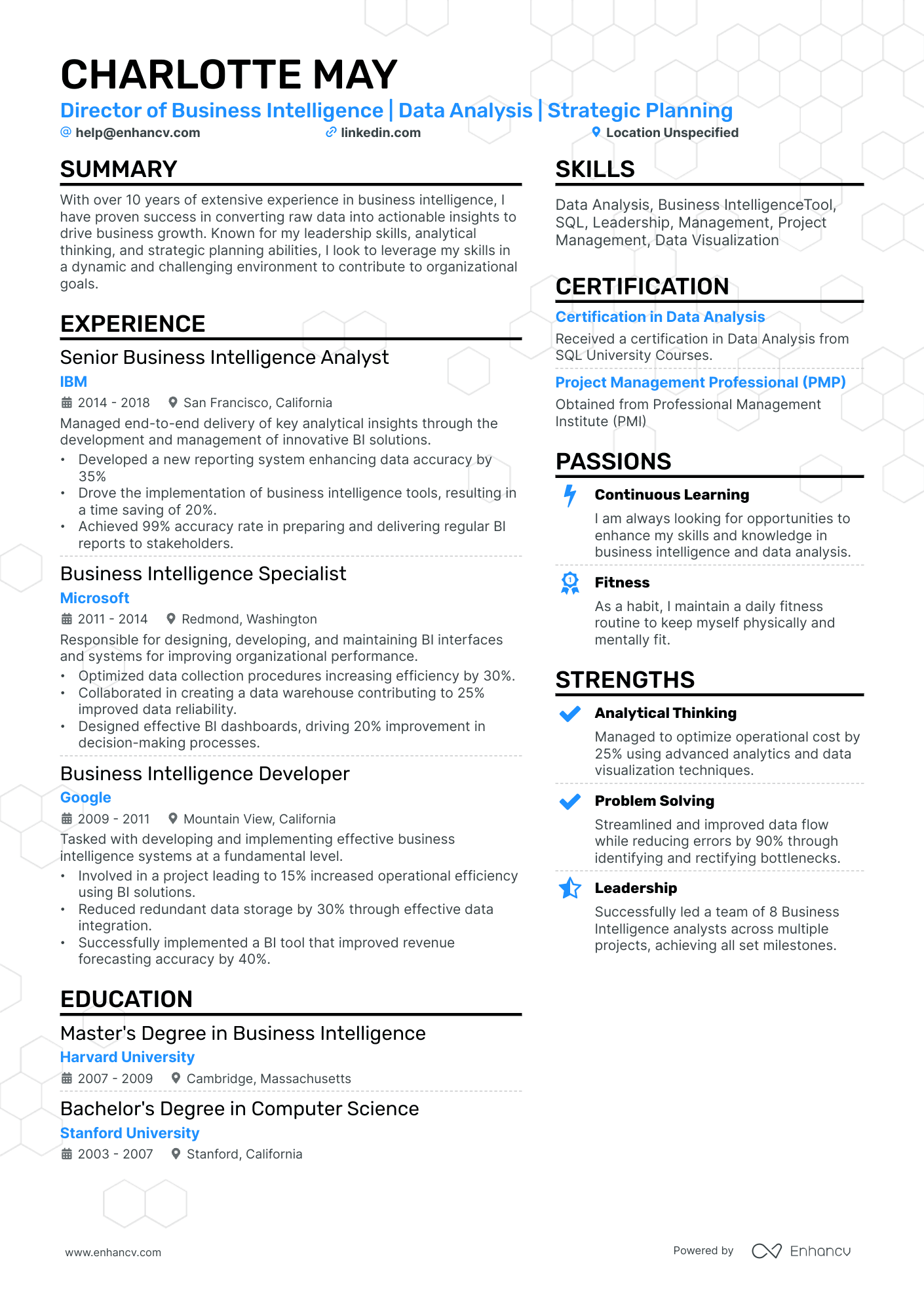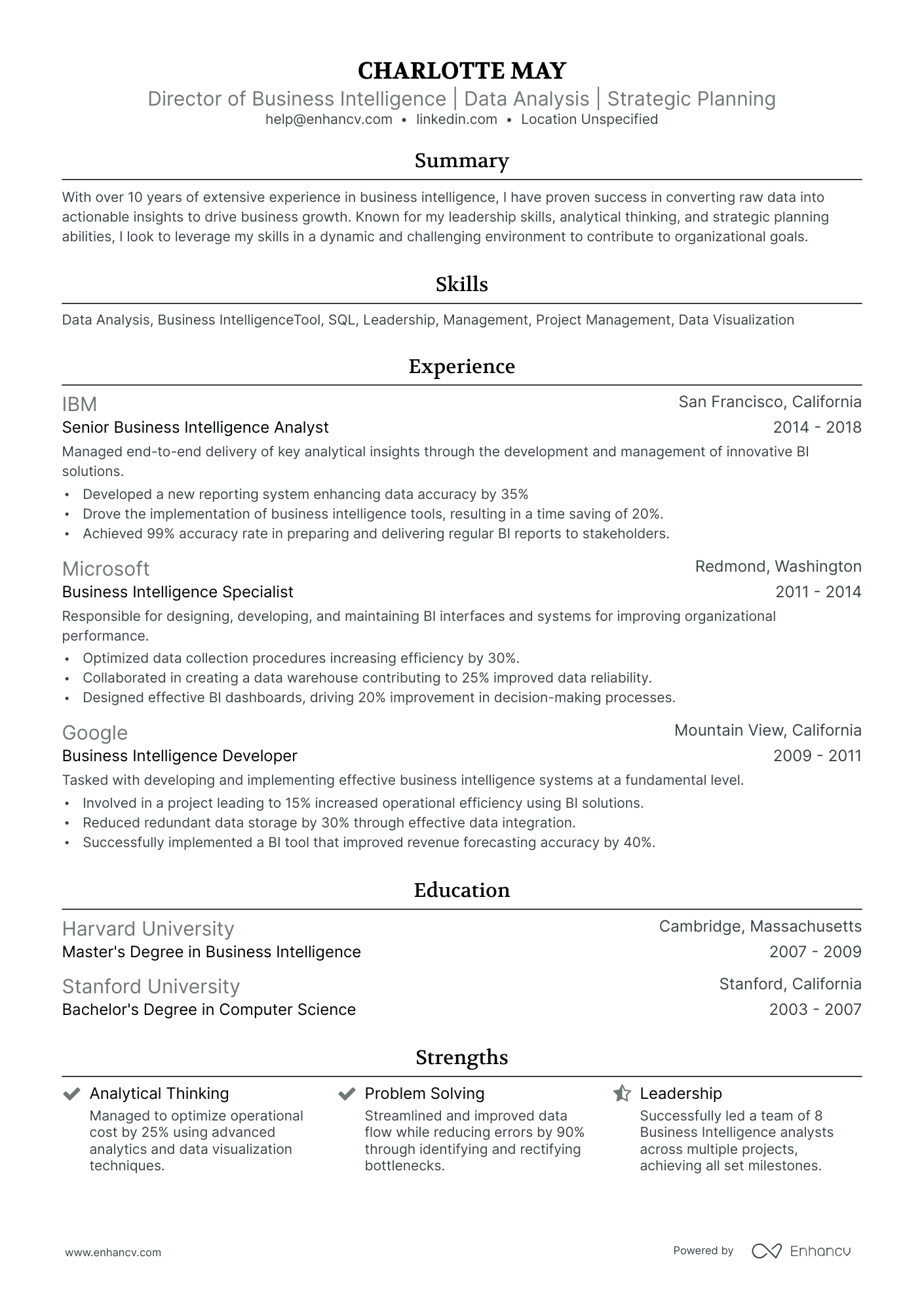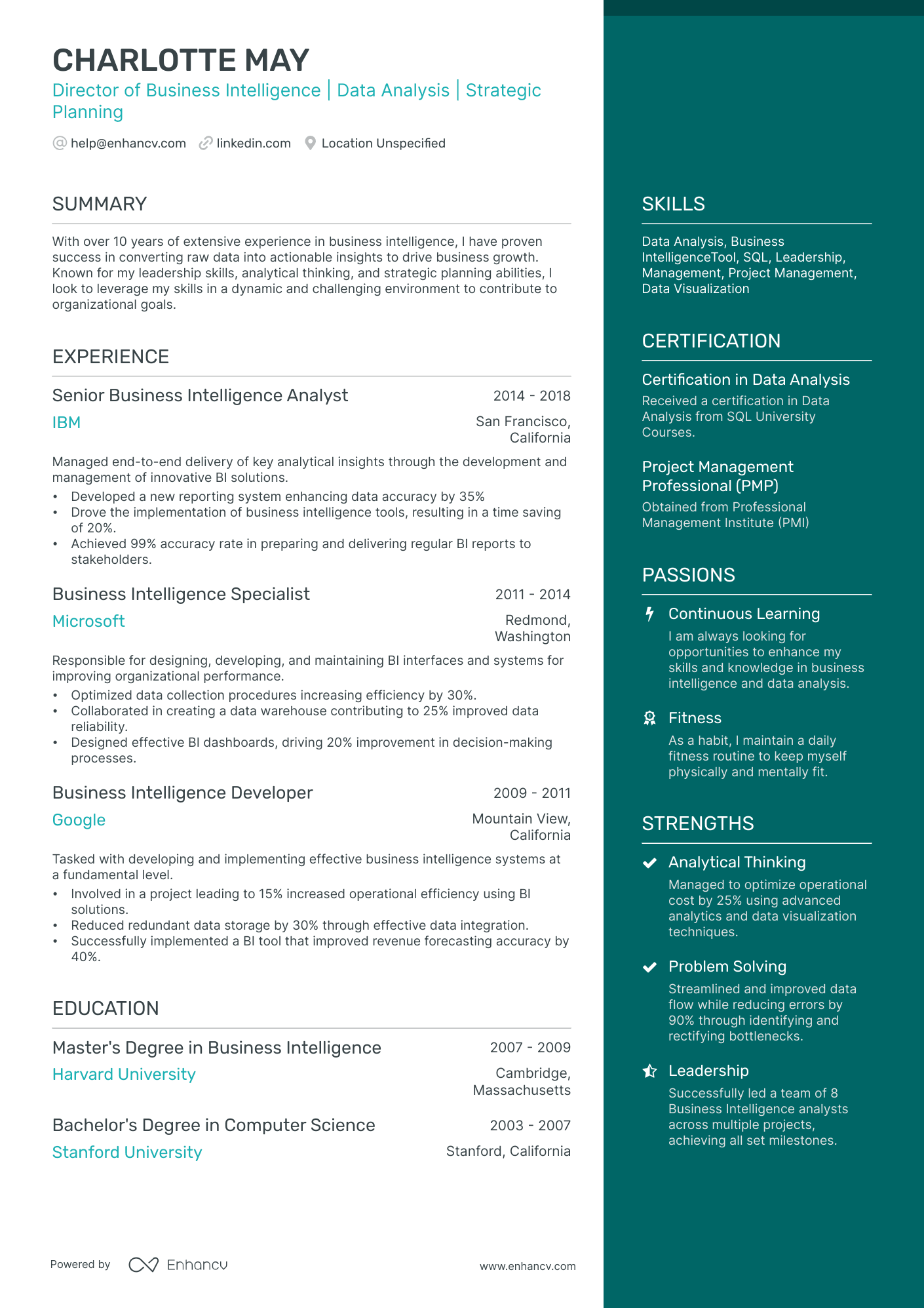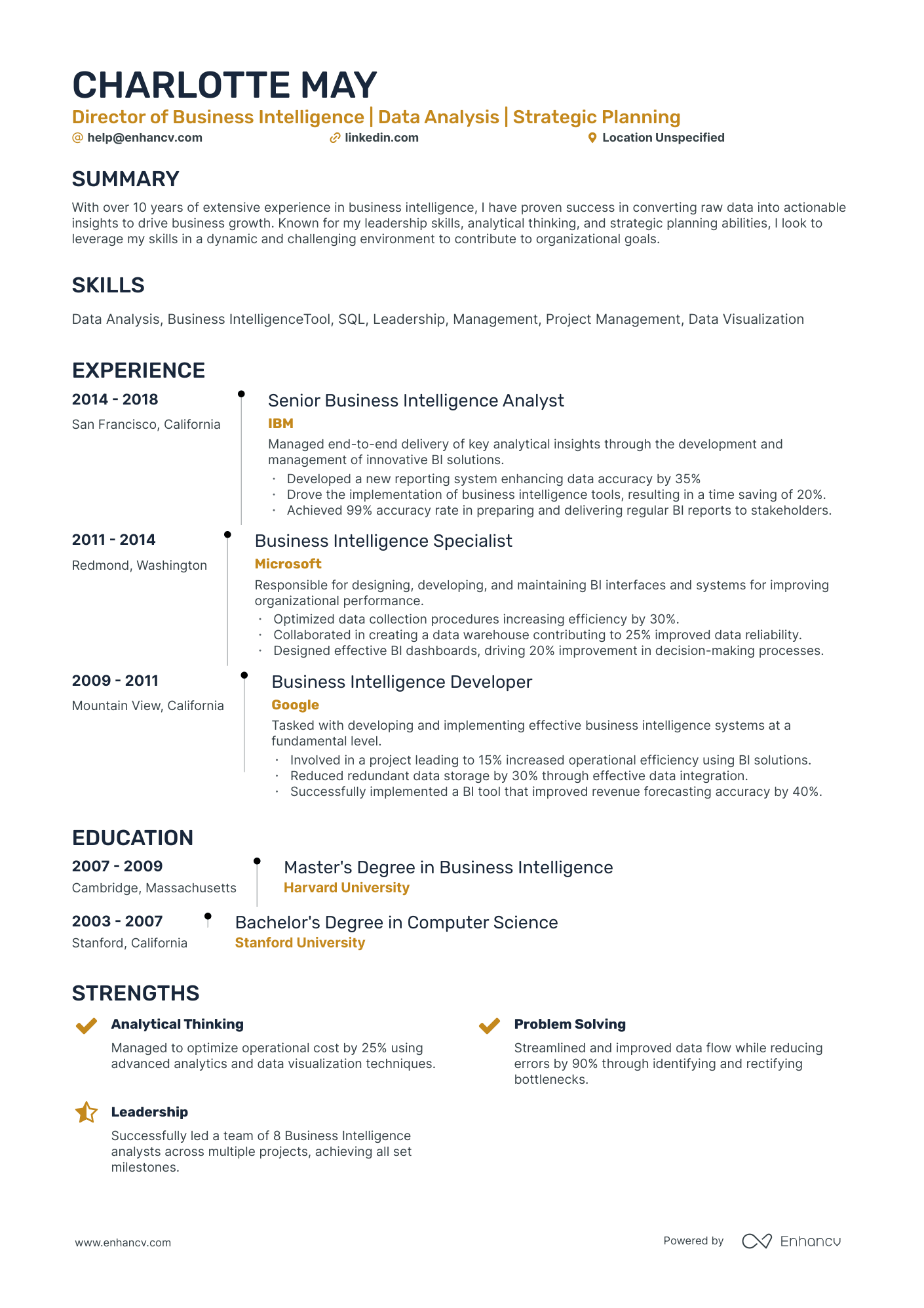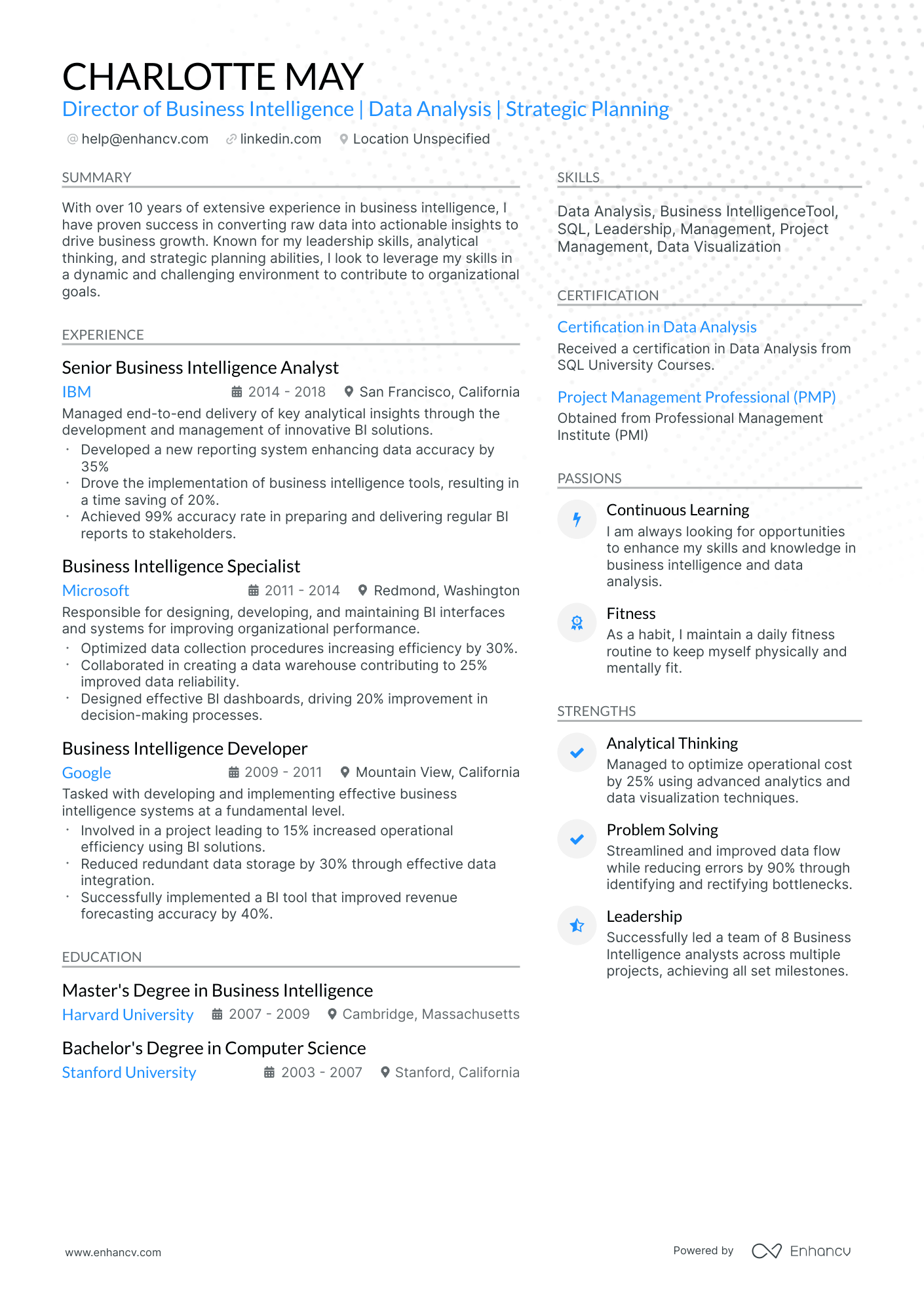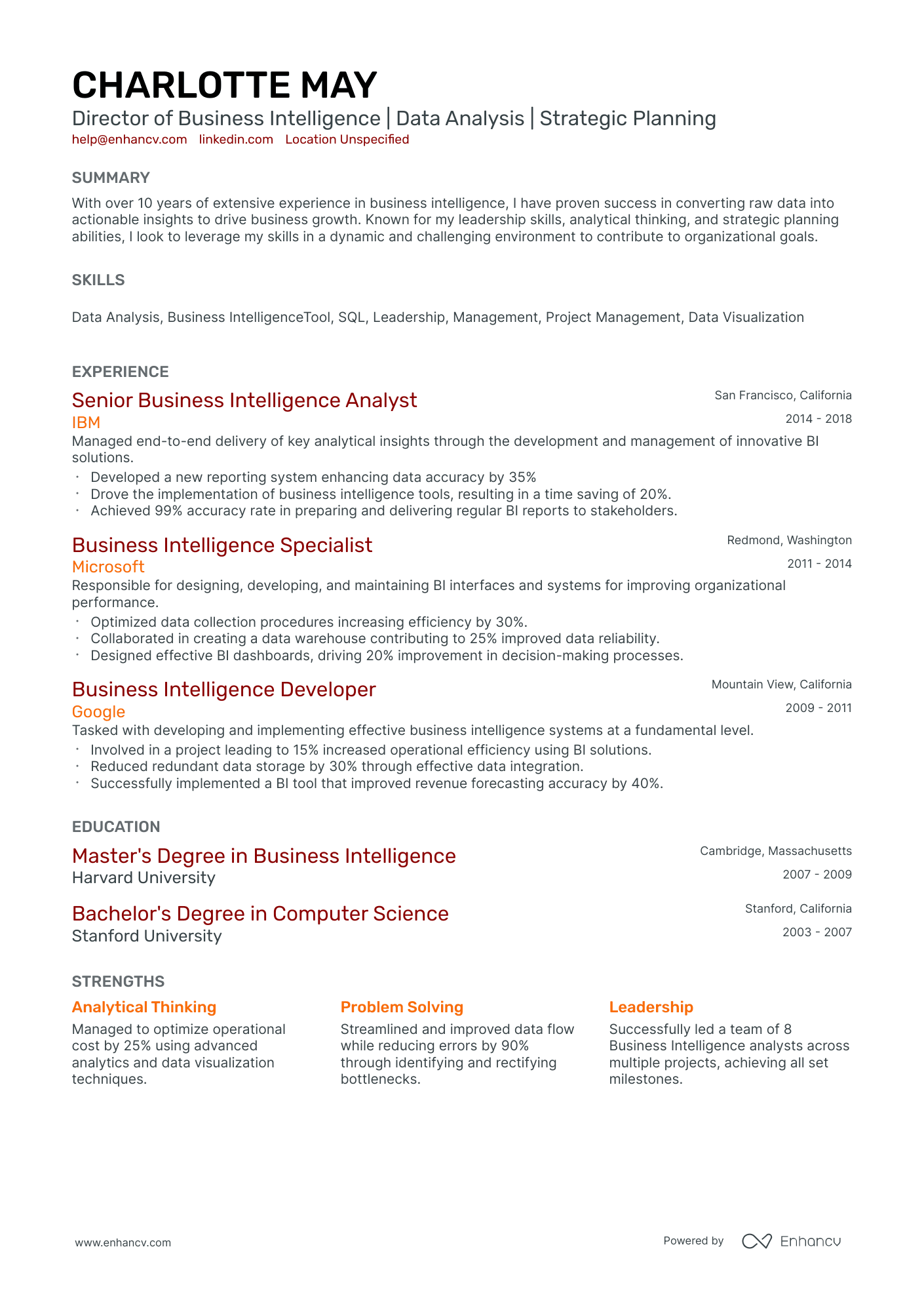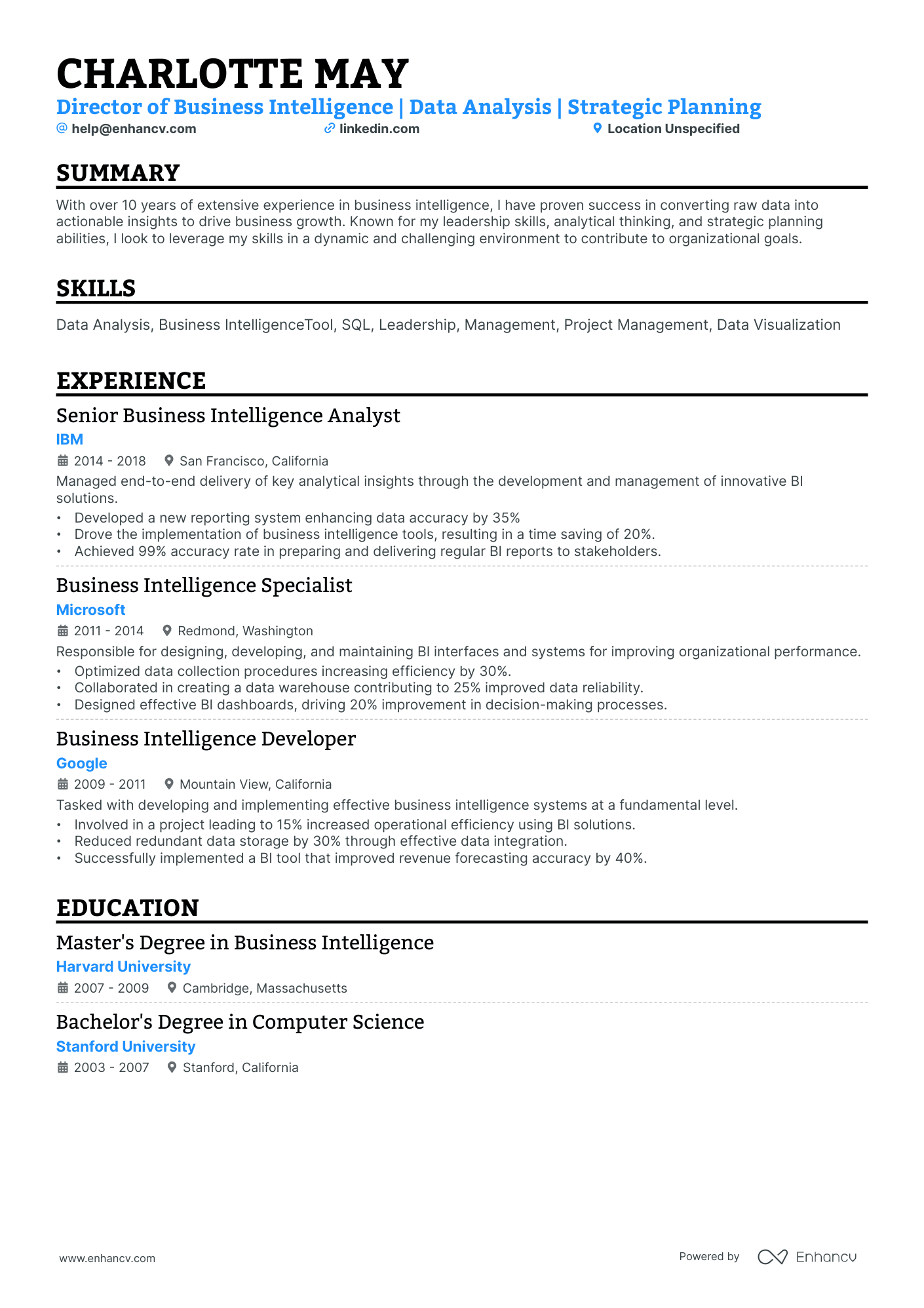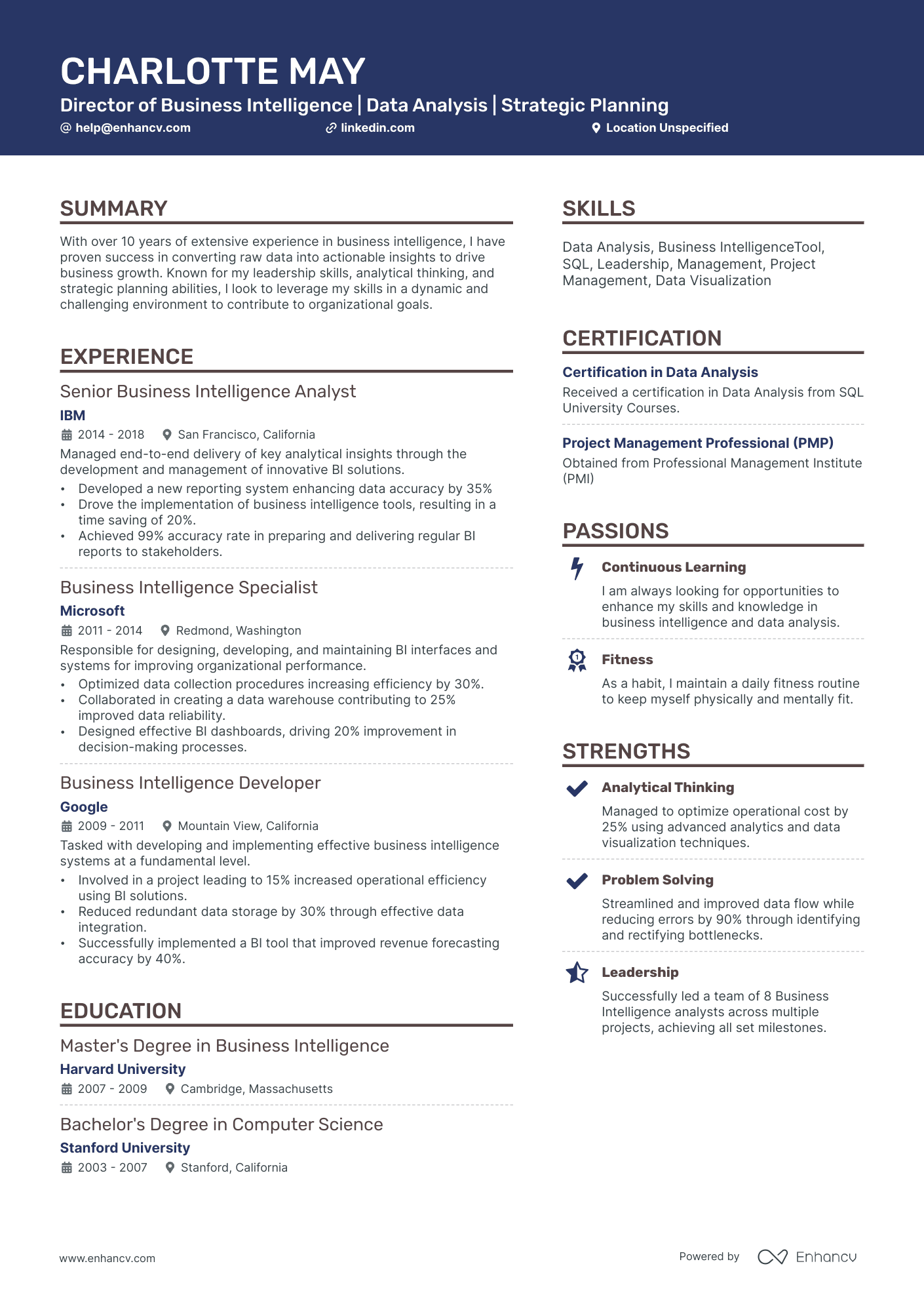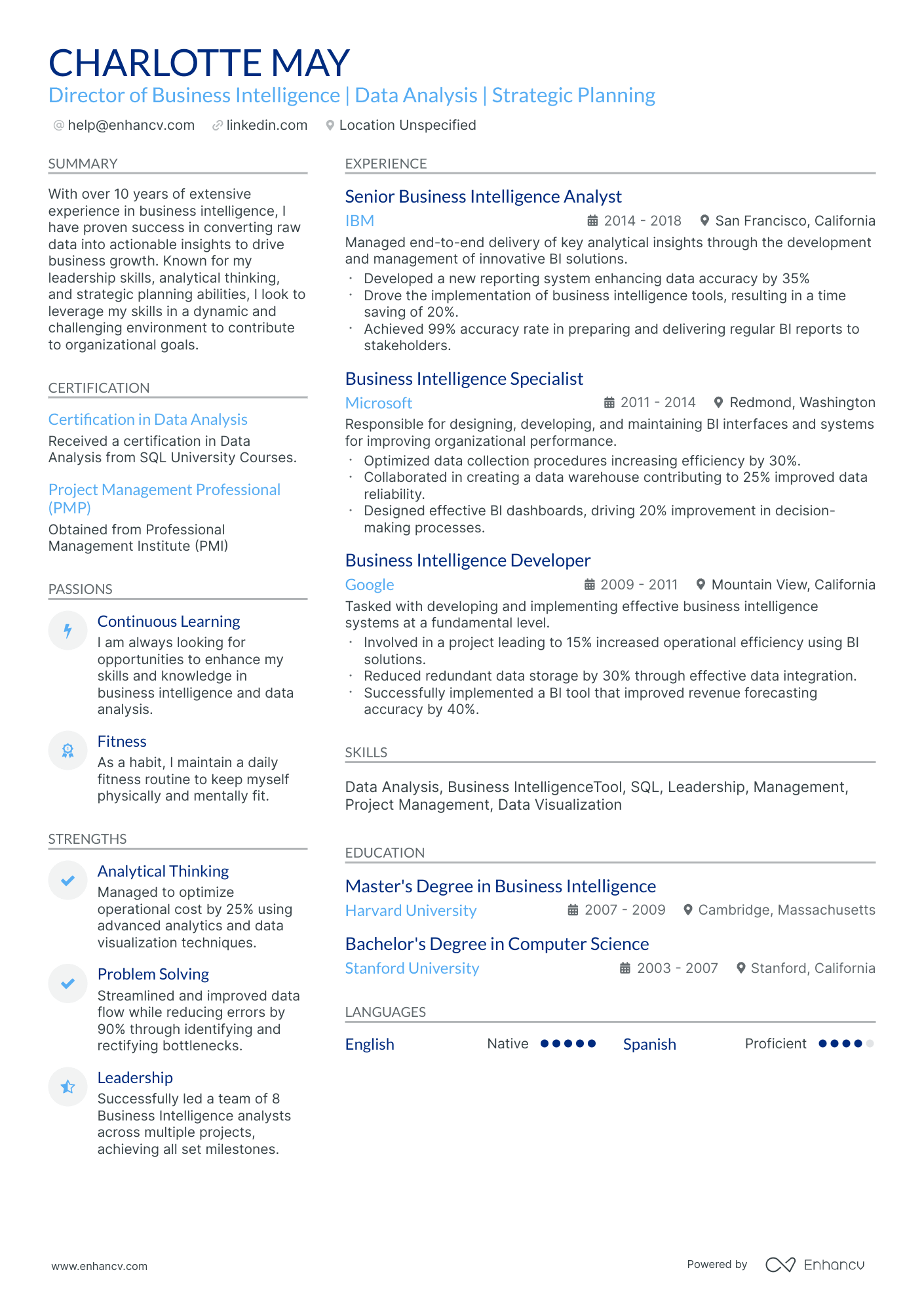A significant resume challenge faced by a business intelligence director is effectively summarizing their broad range of responsibilities, including data analysis, strategic decision-making, and team leadership, in a concise yet comprehensive manner. Our guide can assist by providing targeted examples and templates that showcase how to highlight these diverse skills succinctly, making your resume stand out to recruiters.
Stay tuned for more ideas on how to write your business intelligence director resume:
- Find different business intelligence director resume examples to serve as inspiration to your professional presentation.
- How to use the summary or objective to highlight your career achievements.
- How to create the experience section to tell your story.
- Must have certificates and what to include in the education section of your resume.
Recommended reads:
crafting an impeccable business intelligence director resume format in four steps
Your business intelligence director resume format should be both strategic and reader-friendly. Here's a concise guide to help you achieve that:
- Choose a format that aligns with the job's requirements. If your expertise is directly relevant, the reverse-chronological format is ideal. If you're focusing more on skills, consider the functional or hybrid formats.
- Header: Ensure it's populated with accurate contact details and any relevant portfolio links.
- Length: A one-page resume is standard, but if you have extensive experience, extending to two pages is acceptable.
- File type: To maintain formatting consistency, always opt for PDF.
Keep in mind market-specific formats – for example, a Canadian resume might follow a different structure.
Upload your resume
Drop your resume here or choose a file. PDF & DOCX only. Max 2MB file size.
Pro tip
At the end of the day, recruiters care most about how easily they can scan and read your resume layout. Unless you're aiming for a role in a creative field, it might be best to stick with a straightforward layout and format. Instead, put your energy into showcasing your experience.
Essential components for your call center customer service resume:
- Header: Feature your name prominently. If you have a notable degree or certification, append it next to your name. Include contact details, a link to your portfolio, and a concise headline.
- Summary or Objective: Align your professional trajectory and standout achievements with the desired role.
- Experience: Craft concise bullet points, highlighting tangible successes and contributions.
- Skills: Showcase them throughout your resume and consider a dedicated sidebar for emphasis.
- Education & Certifications: Reinforce your credibility and demonstrate your commitment to the industry.
What recruiters want to see on your resume:
- Proven experience in developing and implementing BI tools and systems, including design of related databases, spreadsheets, or outputs.
- Demonstrable knowledge of data warehouse project management, including experience with data modeling techniques and data mining.
- Proficiency in BI technologies (such as Tableau, Microsoft Power BI, QlikView), programming (XML, Javascript, or ETL frameworks), and database languages (SQL).
- Evidence of excellent communication skills to translate complex data into comprehensible insights for non-technical stakeholders.
- A history of successful leadership, illustrating the ability to manage teams and oversee multiple projects simultaneously.
Recommended reads:
Designing your business intelligence director resume experience to grab recruiters' attention
For the business intelligence director position, it's crucial to show how your expertise matches what they're looking for.
Your resume experience section can be a game-changer. Ensure you:
- Feature roles most relevant to the business intelligence director job you're targeting.
- Avoid diving too deep into ancient history - unless what you did a decade ago is super relevant to the business intelligence director role.
- Structure each bullet to first describe what you did, followed by the skills you utilized, and then the impact of your efforts.
- Quantify your achievements with numbers, possibly highlighting the broader impact on the organization.
- Emphasize transferable skills - those you've gained in past roles that could be valuable in your new role. This showcases your unique professional value.
Crafting the experience section doesn't mean detailing every job you've ever had. Check out the business intelligence director resume samples below to see how top professionals present their experience.
- Developed and implemented a business intelligence strategy, resulting in a 20% increase in revenue for Company A.
- Led a team of analysts to create data-driven insights and dashboards, improving operational efficiency by 15%.
- Collaborated with cross-functional teams to identify key business metrics and develop KPI tracking system.
- Managed end-to-end implementation of business intelligence solutions, driving process optimization and reducing costs by 10% at Company B.
- Designed and executed data mining projects, resulting in actionable recommendations for marketing campaigns that increased customer engagement by 25%.
- Developed and delivered interactive data visualizations to senior management, enabling data-driven decision-making.
- Established and managed a data governance framework, ensuring data accuracy and integrity across the organization at Company C.
- Implemented predictive analytics models to forecast market trends, leading to a 12% improvement in inventory management.
- Collaborated with IT teams to integrate disparate data sources and build a centralized data warehouse.
- Developed and executed a data-driven customer segmentation strategy, resulting in a 15% increase in targeted marketing campaign effectiveness at Company D.
- Led the implementation of self-service BI tools, empowering business users to access and analyze data independently.
- Designed and delivered training programs on data visualization best practices for non-technical stakeholders.
- Managed a team of analysts to identify operational inefficiencies and recommend process improvements, resulting in a cost savings of $500,000 annually at Company E.
- Implemented data quality initiatives, achieving a 20% improvement in data accuracy and reducing reporting errors.
- Collaborated with stakeholders to define business requirements and develop customized BI solutions.
- Developing and executing a data governance strategy to ensure compliance and data integrity across the organization at Company F.
- Leading the migration of on-premises BI infrastructure to the cloud, improving scalability and reducing infrastructure costs by 30%.
- Analyzing and interpreting complex data sets to provide actionable insights for executive decision-making.
- Designed and implemented a business intelligence roadmap, aligning data analytics initiatives with strategic business goals at Company G.
- Led the development of a customer analytics platform, enabling personalized marketing campaigns resulting in a 15% increase in customer retention.
- Provided data-driven recommendations to improve pricing strategies and optimize revenue generation.
- Managed the implementation of data visualization tools, improving data accessibility and enabling real-time reporting at Company H.
- Led a team in developing forecasting models, resulting in a 10% reduction in inventory holding costs.
- Collaborated with business units to define key performance indicators and develop executive dashboards.
- Developed and executed a data quality improvement program, reducing data errors by 20% and improving report accuracy at Company I.
- Implemented advanced analytics techniques, such as predictive modeling and machine learning, to optimize sales forecasting and increase revenue by 18%.
- Led cross-functional teams to identify business opportunities through data analysis and provide actionable insights to stakeholders.
- Managed a team of analysts to design and implement data governance policies, ensuring compliance with industry regulations at Company J.
- Developed and maintained data pipelines, transforming raw data into meaningful insights for various business units.
- Collaborated with IT teams to integrate BI solutions with existing systems and streamline data workflows.
Quantifying impact on your resume
<ul>
Lacking experience? Here's what to do.
Candidates with limited experience often fall into two categories:
- Recent graduates aiming for a business intelligence director role
- Professionals transitioning from a different field
Both can still land a job in the industry. Here's how to optimize the experience section of your business intelligence director resume:
- Highlight your strengths, especially if they align with the job requirements.
- Remove unrelated experiences. Your resume should tell a story that resonates with the business intelligence director role.
- Showcase your personality. Traits like ambition and diligence can make you an attractive candidate.
- Align your experience with the job requirements, ensuring your resume speaks directly to the role.
Recommended reads:
Pro tip
Use the SOAR (Situation - Action - Results) method for each of your business intelligence director experience bullets. Reflect on specific challenges you've addressed, the actions you took, and the outcomes. This approach also preps you for potential interview questions.
Highlighting your hard and soft skills on your business intelligence director resume
The skills section of your business intelligence director resume should showcase your capabilities that align with job requirements.
Your hard skills, or technical skills, demonstrate your proficiency with technological innovations and specific software. On the other hand, your soft skills illustrate how you'd excel in the workplace environment with personal attributes like resilience, negotiation, and organization.
For a well-rounded business intelligence director resume, it's essential to include both. Here's how to craft a standout skills section:
- Prioritize skills listed at the top of the job advert.
- Highlight unique skills you've honed over time.
- Choose soft skills that resonate with the company or department culture.
- Address essential job requirements by listing key skills for the business intelligence director role that haven't been mentioned elsewhere in your resume.
Check out our sample skill list for business intelligence director to get ideas on the most sought-after hard and soft skills in the industry.
Top skills for your business intelligence director resume:
SQL
Python
Tableau
Power BI
Data Warehousing
ETL Tools
Data Modeling
Big Data Technologies
Machine Learning
Cloud Computing (AWS, Azure)
Leadership
Strategic Thinking
Communication
Problem Solving
Analytical Thinking
Collaboration
Adaptability
Project Management
Decision Making
Stakeholder Management
Pro tip
If the job emphasizes team or organizational culture, dedicate a section of your resume to underscore your strengths and achievements. Top-tier business intelligence director candidates also highlight their alignment with a company's values and culture.
Choosing the right certifications and education for your business intelligence director resume
Your education section can highlight skills and experiences perfect for the job.
- List college or university degrees with the school name and dates.
- If you're still studying, mention your expected graduation date.
- Think twice before adding unrelated degrees. Space on your resume is precious.
- Discuss educational achievements if they boost your job relevance.
There are many certifications out there. Which ones should you include?
- List your main degree in a separate section with the school name and dates.
- Only add certifications that highlight your skills and experience.
- Place unique or recent certifications near the top.
- Add a brief description to certifications if it helps show your skills.
Remember, it's not about quantity but relevance.
Best certifications to list on your resume
Pro tip
List your degrees in reverse order, starting with the newest. A recent PhD or unique field could set you apart.
Recommended reads:
Choosing the right business intelligence director resume summary or objective
The top section of your resume is pivotal. It should encapsulate your alignment with the job, your unique skill set, and your professional expertise.
Both the resume summary and resume objective can serve this purpose:
- Use the resume objective to spotlight your current achievements and future aspirations. Highlight how you envision your growth in the prospective role.
- Opt for the resume summary to succinctly present your most relevant professional highlights. Aim for brevity, ideally within five sentences.
Ultimately, these sections offer a glimpse into your professional persona and the unique value you bring.
Resume summary and objective examples for a business intelligence director resume
Optimize your resume summary and objective for ATS
Drop your resume here or choose a file.
PDF & DOCX only. Max 2MB file size.
Additional sections to elevate your business intelligence director resume
To further differentiate your business intelligence director application, consider adding sections like:
- Publications
- Projects
- Awards
- Hobbies (only if they align with the job or showcase relevant skills).
These sections can further demonstrate your technical acumen and interpersonal skills.
Key takeaways
- A clear resume layout helps present your info well.
- Use all main resume sections to show how you fit the job.
- Detail specific skills or tasks and their impact.
- Show your personality through interests or hobbies.
- List certifications to back up your technical skills.
